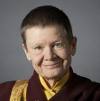
May all sentient beings enjoy happiness
and the root of happiness.
May we be free from suffering
and the root of suffering.
May we not be separated from
the great happiness devoid of suffering.
May we dwell in the great equanimity
free from passion, aggression, and prejudice.
-- THE FOUR LIMITLESS ONES CHANT
It's up to us. We can spend our lives cultivating our resentments and cravings or we can explore the path of the warrior -- nurturing open-mindedness and courage. Most of us keep strengthening our negative habits and therefore sow the seeds of our own suffering. The bodhichitta practices, however, are ways for us to sow the seeds of well being. Particularly powerful are the aspiration practices of the four limitless qualities -- loving-kindness, compassion, joy, and equanimity.
In these practices we start close to home: we express the wish that we and our loved ones enjoy happiness and be free of suffering. Then we gradually extend that aspiration to a widening circle of relationships. We start just where we are, where the aspirations feel genuine.
We begin by acknowledging where we already feel love, compassion, joy, and equanimity. We locate our current experience of these four boundless qualities, however limited they may he: in our love of music, in our empathy with children, in the joy we feel on hearing good news, or in the equanimity we experience when we are with good friends. Even though we may think that what we already experience is too meager, nevertheless we start with that and nurture it. It doesn't have to be grand.
Having Insight Into Your Current Experiences
 Cultivating these four qualities gives us insight into our current experience. It gives us understanding of the state of our mind and heart right now. We get to know the experience of love and compassion, of joy and equanimity, and also of their opposites. We learn how it feels when one of the four qualities is stuck and how it feels when it is flowing freely. We never pretend that we feel anything we don't. The practice depends on embracing our whole experience. By becoming intimate with how we close down and how we open up, we awaken our unlimited potential.
Cultivating these four qualities gives us insight into our current experience. It gives us understanding of the state of our mind and heart right now. We get to know the experience of love and compassion, of joy and equanimity, and also of their opposites. We learn how it feels when one of the four qualities is stuck and how it feels when it is flowing freely. We never pretend that we feel anything we don't. The practice depends on embracing our whole experience. By becoming intimate with how we close down and how we open up, we awaken our unlimited potential.
Even though we start this practice with the aspiration for ourselves or our loved ones to be free of suffering, it may feel as if we're just mouthing words. Even this compassionate wish for those nearest to us may feel phony. But as long as we're not deceiving ourselves, this pretending has the power to uncover bodhichitta. Even though we know exactly what we feel, we make the aspirations in order to move beyond what now seems possible. After we practice for ourselves and those near us, we stretch even further: we send goodwill toward the neutral people in our lives and also to the people we don't like.
It might feel like stretching into make-believe to say, "May this person who is driving me crazy enjoy happiness and be free of suffering." Probably what we genuinely feel is anger. This practice is like a workout that stretches the heart beyond its current capabilities. We can expect to encounter resistance.
We discover that we have our limits: we can stay open to some people, but we remain closed to others. We see both our clarity and our confusion. We are learning firsthand what everyone who has ever set out on this path has learned: we are all a paradoxical bundle of rich potential that consists of both neurosis and wisdom.
Aspiration practice is different from making affirmations. Affirmations are like telling yourself that you are compassionate and brave in order to hide the fact that secretly you feel like a loser. In practicing the four limitless qualities, we aren't trying to convince ourselves of anything, nor are we trying to hide our true feelings. We are expressing our willingness to open our hearts and move closer to our fears. Aspiration practice helps us to do this in increasingly difficult relationships.
Awakening The Four Qualities
If we acknowledge the love, compassion, joy, and equanimity that we feel now and nurture it through these practices, the expansion of those qualities will happen by itself. Awakening the four qualities provides the necessary warmth for an unlimited strength to emerge. They have the power to loosen up useless habits and to melt the ice-hardness of our fixations and defenses. We are not forcing ourselves to be good.
When we see how cold or aggressive we can be, we aren't asking ourselves to repent. Rather, these aspiration practices develop our ability to remain steadfast with our experience, whatever it may be. In this way we come to know the difference between a closed and an open mind, gradually developing the self-awareness and kindness we need to benefit others. These practices unblock our love and compassion, joy and equanimity, tapping into their boundless potential to expand.
Reprinted with permission of the publisher,
Shambhala Publications, Inc. ©2001. www.shambhala.com
Article Source
The Places That Scare You: A Guide to Fearlessness in Difficult Times
by Pema Chödrön.
 Pema Chödrön provides essential tools for dealing with the many difficulties that life throws our way, teaching us how to awaken our basic human goodness and connect deeply with others—to accept ourselves and everything around us complete with faults and imperfections. She shows the strength that comes from staying in touch with what’s happening in our lives right now and helps us unmask the ways in which our egos cause us to resist life as it is. If we go to the places that scare us, Pema suggests, we just might find the boundless life we’ve always dreamed of.
Pema Chödrön provides essential tools for dealing with the many difficulties that life throws our way, teaching us how to awaken our basic human goodness and connect deeply with others—to accept ourselves and everything around us complete with faults and imperfections. She shows the strength that comes from staying in touch with what’s happening in our lives right now and helps us unmask the ways in which our egos cause us to resist life as it is. If we go to the places that scare us, Pema suggests, we just might find the boundless life we’ve always dreamed of.
More books on this topic
About the Author
 Pema Chödrön is an American Buddhist nun and one of the foremost students of Chogyam Trungpa, the renowned Tibetan meditation master. She is the author of The Wisdom of No Escape, Start Where You Are, and the best-selling When Things Fall Apart. She is the resident teacher at Gampo Abbey, Cape Breton, Nova Scotia, the first Tibetan monastery for Westerners. Find out more at https://pemachodronfoundation.org.
Pema Chödrön is an American Buddhist nun and one of the foremost students of Chogyam Trungpa, the renowned Tibetan meditation master. She is the author of The Wisdom of No Escape, Start Where You Are, and the best-selling When Things Fall Apart. She is the resident teacher at Gampo Abbey, Cape Breton, Nova Scotia, the first Tibetan monastery for Westerners. Find out more at https://pemachodronfoundation.org.
Video by Pema Chödrön
{vembed Y=8_0mxdFtxsQ}



























